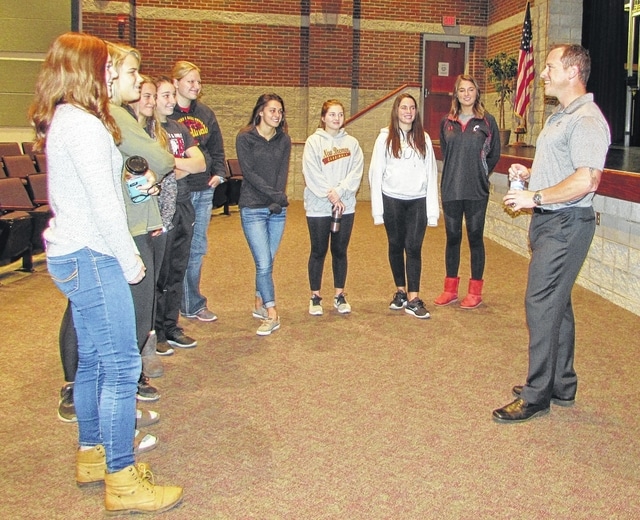
NEW BREMEN — Students and faculty of New Bremen High School commemorated Veterans Day, Friday, Nov. 11, by listening to a former Navy SEAL, who urged them practice disciplined responses to events in their lives.
Scott Daly, of New Albany, a director of the Dublin, Ohio-based corporate training and consulting firm, Focus 3, walked his audience through steps to prepare them to do just that.
“The world is constantly changing. You will find life increasingly difficult if you don’t,” he said.
Daly grew up in New Carlisle, graduated from the Ohio State University and worked in sales before enlisting in the Navy after Sept. 11. In addition to operating on active SEAL teams, he trained junior officers and enlisted SEALs. He was in the Navy for 13 years.
Leadership, culture and behavior have to be aligned if people want to lead elite lives, he told the students.
“If I want better things, what do I change? Behavior,” he said. “Right now, across America, there is a mountain of average — average students, average athletes, average businesses. What’s the difference between elite athletes, students, businessmen and average? It’s behavior.”
Daly stressed that disciplined behavior takes hard work. Most people are average because people are lazy.
“People don’t want to work hard. What do we expect of people who are really, really good? We expect them to stay there. What do we expect of average people? Nothing,” he said. Being average makes people feel secure, he added.
“If I step up, I might fail. But failure is not a negative thing,” he said. It is through failure that people learn and grow.
He noted that many businesses talk about the importance of their ideas, values and knowledge.
“None of that means squat,” Daly said. “An idea becomes valuable when it turns into action. It doesn’t matter what you value. It matters how you behave. What you know is only going to be valuable when you turn it into a skill.”
It’s easier when everyone on a project or a team is pulling the same way, he said. But just having a good game plan doesn’t make that happen.
“Culture eats strategy for lunch,” he said. What skills should people put on resumes, he asked rhetorically.
“Job skills are driven by behavior skills. Job skills may be your ticket to the game but behavior skills are going to win the game. What’s easier to teach? Push button A, then button B, or how to be a good listener? What do we fire people for? Behavioral skills,” he said.
Daly recounted a story about the Challenger disaster. In 1986, a space shuttle exploded just seconds after take-off, killing all seven astronauts aboard. Two engineers knew ahead of time that an explosion was likely to happen. They even wrote a letter warning officials of the possibility. But that’s all they did. When no one paid attention to the letter, the project moved forward with deadly results.
“They were engineers. They couldn’t communicate how dangerous the shuttle was,” Daly said. “If you want change, it starts with you.”
Everyone “owns” 20 square feet of belief and behavior, he noted.
“What you do in your 20 square feet has an immense impact,” he said. It’s crazy that people think their 20 square feet don’t matter.
“If you’re on a team or in a club, is it affected by your behavior? Does the team have an effect on the school?” he asked.
To illustrate his point, he told about a decision he had to make when he was in Baghdad. It was solely his decision: should the U.S. give satellite-jamming equipment to the Iraqis?
“I did research and decided not to give it to them. Who would have it today if we had? ISIS. It would jam us. We wouldn’t be able to target them. That was one decision, nine years ago,” he said.
He cautioned students not to blame other people or complain about situations they find themselves in, but to look for solutions. He urged them to talk to people they have problems with rather than posting negative comments on social media.
“Talk to the person instead of about him,” Daly said.
All of these concepts have to be practiced for them to be disciplined responses to events that will come up in people’s lives.
“Disciplined behavior comes from hard work. That’s the source of our happiness. When we are challenged, we will go back to an old habit because it’s easy. The pull of old habits is dangerous. If you can get out of your comfort zone, you will do great things,” Daly said. “Stuff is going to happen. You will respond to that stuff. The most successful people I know are focused on the outcome. If you want better behavior, the only one holding you back is you.”


